Civil Law Assignment: Pandemic Management and Rule of Law in Australia
VerifiedAdded on 2022/09/14
|7
|1776
|18
Discussion Board Post
AI Summary
This discussion post analyzes the advantages and disadvantages of Australia's federal structure in managing a nationwide pandemic, examining the distribution of powers between the Commonwealth and state governments. It highlights the benefits of a federal system, such as protection against tyranny and increased citizen participation, while also acknowledging potential drawbacks like disparities in state policies and conflicts between national and state laws. The post also addresses the challenges posed by algorithmic decision-making by the government to the rule of law, discussing how automated systems impact various aspects of governance, from social welfare to criminal justice, and their implications for fairness, transparency, and accountability. The author references several scholarly articles to support their arguments, providing a comprehensive overview of these complex issues.
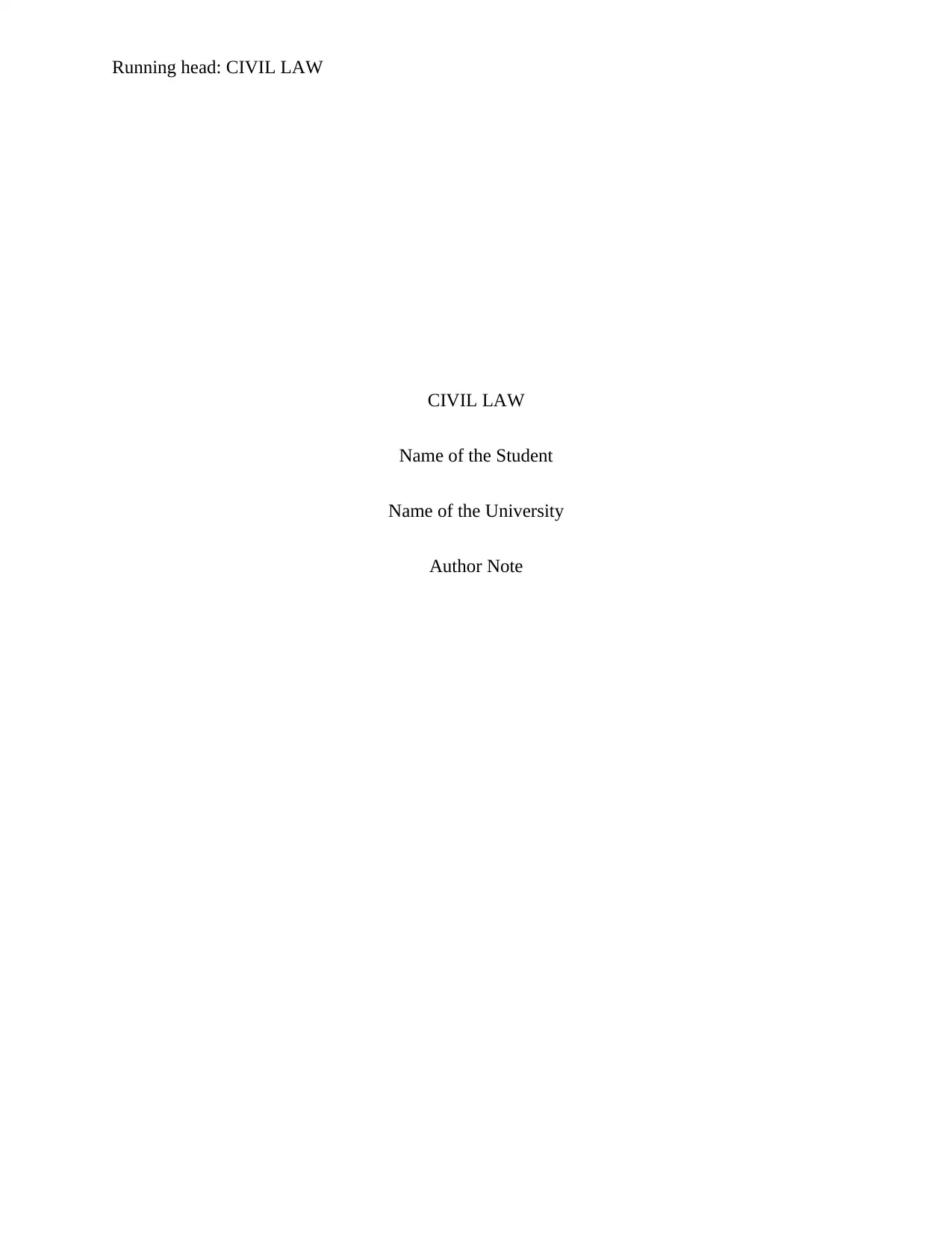
Running head: CIVIL LAW
CIVIL LAW
Name of the Student
Name of the University
Author Note
CIVIL LAW
Name of the Student
Name of the University
Author Note
Paraphrase This Document
Need a fresh take? Get an instant paraphrase of this document with our AI Paraphraser
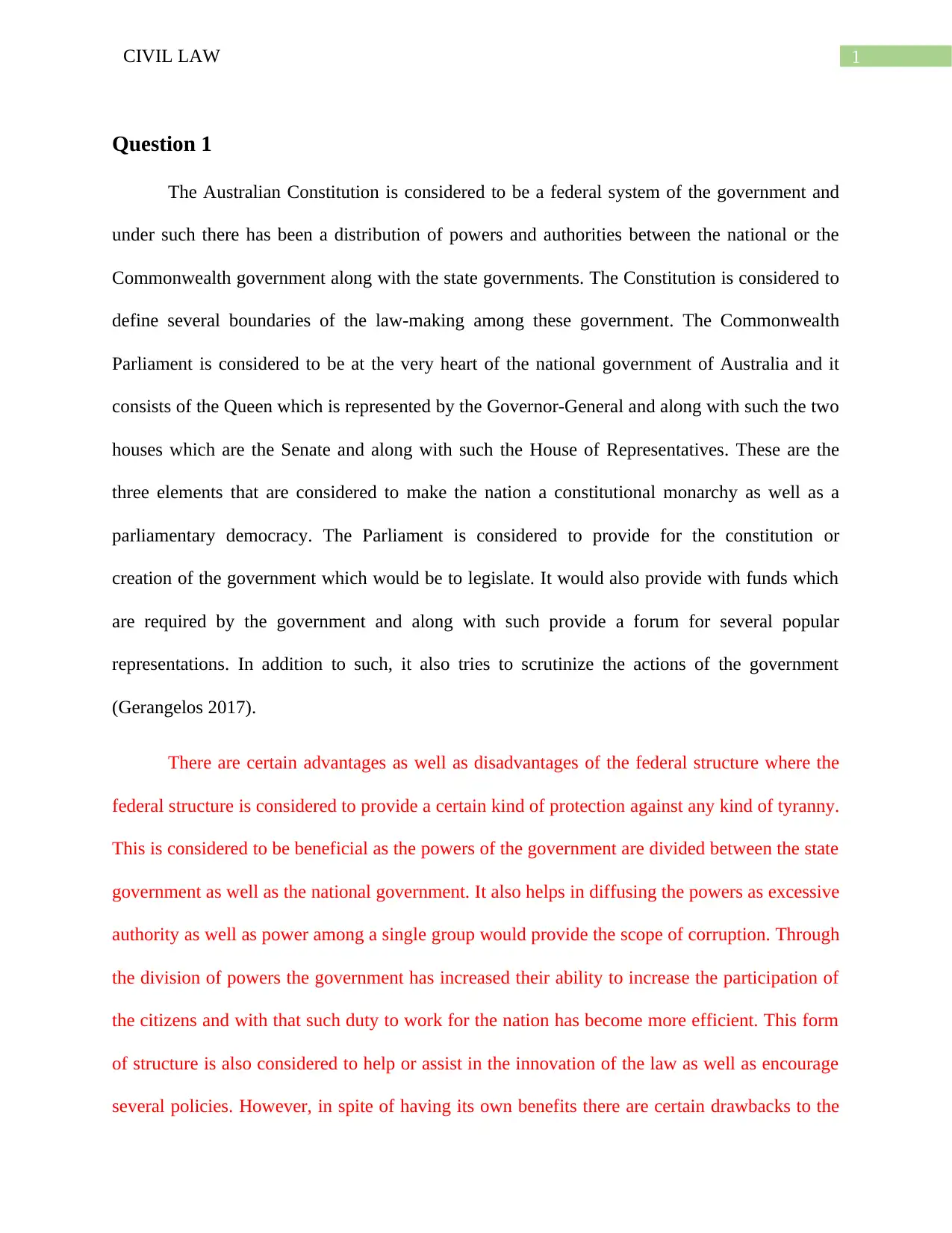
1CIVIL LAW
Question 1
The Australian Constitution is considered to be a federal system of the government and
under such there has been a distribution of powers and authorities between the national or the
Commonwealth government along with the state governments. The Constitution is considered to
define several boundaries of the law-making among these government. The Commonwealth
Parliament is considered to be at the very heart of the national government of Australia and it
consists of the Queen which is represented by the Governor-General and along with such the two
houses which are the Senate and along with such the House of Representatives. These are the
three elements that are considered to make the nation a constitutional monarchy as well as a
parliamentary democracy. The Parliament is considered to provide for the constitution or
creation of the government which would be to legislate. It would also provide with funds which
are required by the government and along with such provide a forum for several popular
representations. In addition to such, it also tries to scrutinize the actions of the government
(Gerangelos 2017).
There are certain advantages as well as disadvantages of the federal structure where the
federal structure is considered to provide a certain kind of protection against any kind of tyranny.
This is considered to be beneficial as the powers of the government are divided between the state
government as well as the national government. It also helps in diffusing the powers as excessive
authority as well as power among a single group would provide the scope of corruption. Through
the division of powers the government has increased their ability to increase the participation of
the citizens and with that such duty to work for the nation has become more efficient. This form
of structure is also considered to help or assist in the innovation of the law as well as encourage
several policies. However, in spite of having its own benefits there are certain drawbacks to the
Question 1
The Australian Constitution is considered to be a federal system of the government and
under such there has been a distribution of powers and authorities between the national or the
Commonwealth government along with the state governments. The Constitution is considered to
define several boundaries of the law-making among these government. The Commonwealth
Parliament is considered to be at the very heart of the national government of Australia and it
consists of the Queen which is represented by the Governor-General and along with such the two
houses which are the Senate and along with such the House of Representatives. These are the
three elements that are considered to make the nation a constitutional monarchy as well as a
parliamentary democracy. The Parliament is considered to provide for the constitution or
creation of the government which would be to legislate. It would also provide with funds which
are required by the government and along with such provide a forum for several popular
representations. In addition to such, it also tries to scrutinize the actions of the government
(Gerangelos 2017).
There are certain advantages as well as disadvantages of the federal structure where the
federal structure is considered to provide a certain kind of protection against any kind of tyranny.
This is considered to be beneficial as the powers of the government are divided between the state
government as well as the national government. It also helps in diffusing the powers as excessive
authority as well as power among a single group would provide the scope of corruption. Through
the division of powers the government has increased their ability to increase the participation of
the citizens and with that such duty to work for the nation has become more efficient. This form
of structure is also considered to help or assist in the innovation of the law as well as encourage
several policies. However, in spite of having its own benefits there are certain drawbacks to the
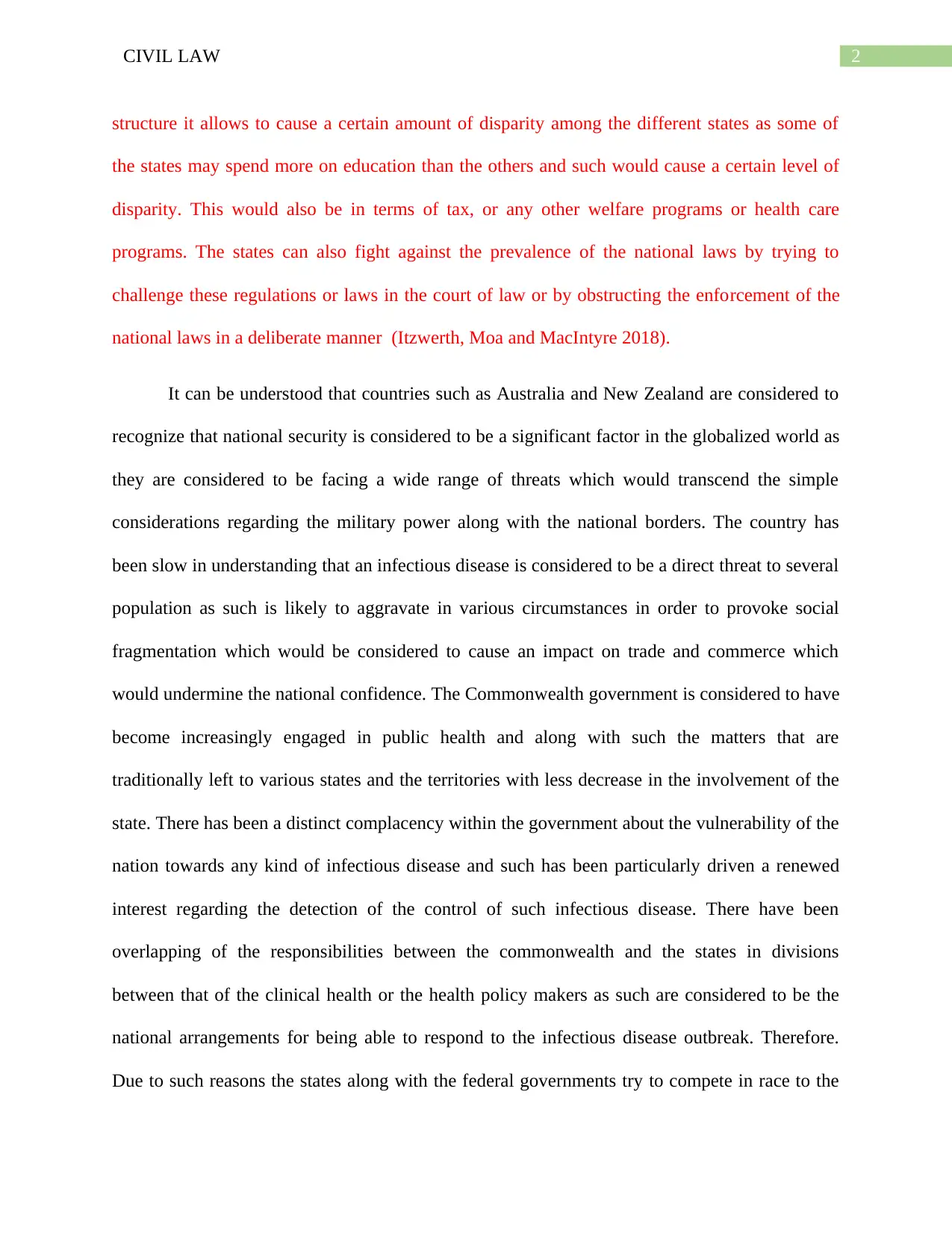
2CIVIL LAW
structure it allows to cause a certain amount of disparity among the different states as some of
the states may spend more on education than the others and such would cause a certain level of
disparity. This would also be in terms of tax, or any other welfare programs or health care
programs. The states can also fight against the prevalence of the national laws by trying to
challenge these regulations or laws in the court of law or by obstructing the enforcement of the
national laws in a deliberate manner (Itzwerth, Moa and MacIntyre 2018).
It can be understood that countries such as Australia and New Zealand are considered to
recognize that national security is considered to be a significant factor in the globalized world as
they are considered to be facing a wide range of threats which would transcend the simple
considerations regarding the military power along with the national borders. The country has
been slow in understanding that an infectious disease is considered to be a direct threat to several
population as such is likely to aggravate in various circumstances in order to provoke social
fragmentation which would be considered to cause an impact on trade and commerce which
would undermine the national confidence. The Commonwealth government is considered to have
become increasingly engaged in public health and along with such the matters that are
traditionally left to various states and the territories with less decrease in the involvement of the
state. There has been a distinct complacency within the government about the vulnerability of the
nation towards any kind of infectious disease and such has been particularly driven a renewed
interest regarding the detection of the control of such infectious disease. There have been
overlapping of the responsibilities between the commonwealth and the states in divisions
between that of the clinical health or the health policy makers as such are considered to be the
national arrangements for being able to respond to the infectious disease outbreak. Therefore.
Due to such reasons the states along with the federal governments try to compete in race to the
structure it allows to cause a certain amount of disparity among the different states as some of
the states may spend more on education than the others and such would cause a certain level of
disparity. This would also be in terms of tax, or any other welfare programs or health care
programs. The states can also fight against the prevalence of the national laws by trying to
challenge these regulations or laws in the court of law or by obstructing the enforcement of the
national laws in a deliberate manner (Itzwerth, Moa and MacIntyre 2018).
It can be understood that countries such as Australia and New Zealand are considered to
recognize that national security is considered to be a significant factor in the globalized world as
they are considered to be facing a wide range of threats which would transcend the simple
considerations regarding the military power along with the national borders. The country has
been slow in understanding that an infectious disease is considered to be a direct threat to several
population as such is likely to aggravate in various circumstances in order to provoke social
fragmentation which would be considered to cause an impact on trade and commerce which
would undermine the national confidence. The Commonwealth government is considered to have
become increasingly engaged in public health and along with such the matters that are
traditionally left to various states and the territories with less decrease in the involvement of the
state. There has been a distinct complacency within the government about the vulnerability of the
nation towards any kind of infectious disease and such has been particularly driven a renewed
interest regarding the detection of the control of such infectious disease. There have been
overlapping of the responsibilities between the commonwealth and the states in divisions
between that of the clinical health or the health policy makers as such are considered to be the
national arrangements for being able to respond to the infectious disease outbreak. Therefore.
Due to such reasons the states along with the federal governments try to compete in race to the
⊘ This is a preview!⊘
Do you want full access?
Subscribe today to unlock all pages.

Trusted by 1+ million students worldwide
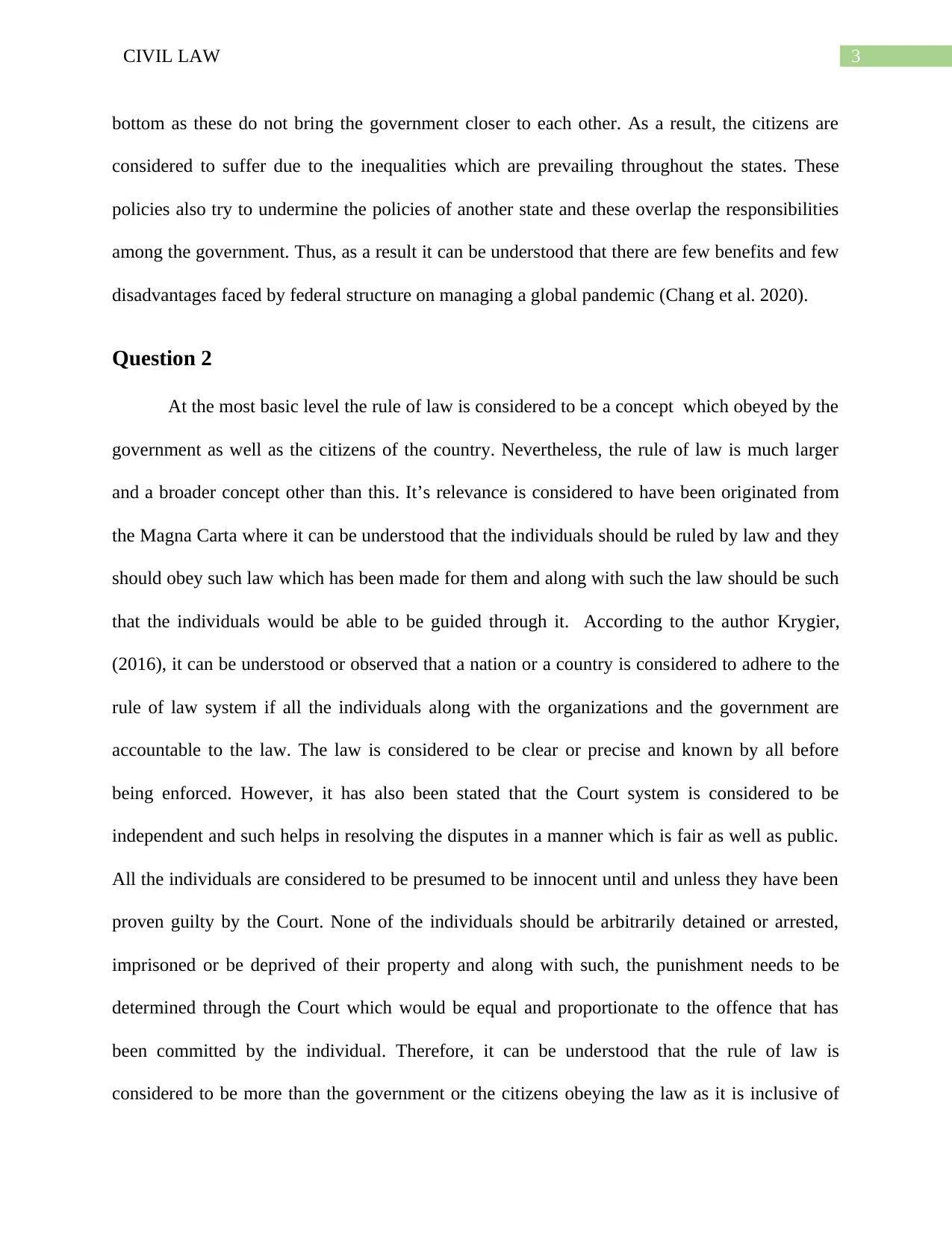
3CIVIL LAW
bottom as these do not bring the government closer to each other. As a result, the citizens are
considered to suffer due to the inequalities which are prevailing throughout the states. These
policies also try to undermine the policies of another state and these overlap the responsibilities
among the government. Thus, as a result it can be understood that there are few benefits and few
disadvantages faced by federal structure on managing a global pandemic (Chang et al. 2020).
Question 2
At the most basic level the rule of law is considered to be a concept which obeyed by the
government as well as the citizens of the country. Nevertheless, the rule of law is much larger
and a broader concept other than this. It’s relevance is considered to have been originated from
the Magna Carta where it can be understood that the individuals should be ruled by law and they
should obey such law which has been made for them and along with such the law should be such
that the individuals would be able to be guided through it. According to the author Krygier,
(2016), it can be understood or observed that a nation or a country is considered to adhere to the
rule of law system if all the individuals along with the organizations and the government are
accountable to the law. The law is considered to be clear or precise and known by all before
being enforced. However, it has also been stated that the Court system is considered to be
independent and such helps in resolving the disputes in a manner which is fair as well as public.
All the individuals are considered to be presumed to be innocent until and unless they have been
proven guilty by the Court. None of the individuals should be arbitrarily detained or arrested,
imprisoned or be deprived of their property and along with such, the punishment needs to be
determined through the Court which would be equal and proportionate to the offence that has
been committed by the individual. Therefore, it can be understood that the rule of law is
considered to be more than the government or the citizens obeying the law as it is inclusive of
bottom as these do not bring the government closer to each other. As a result, the citizens are
considered to suffer due to the inequalities which are prevailing throughout the states. These
policies also try to undermine the policies of another state and these overlap the responsibilities
among the government. Thus, as a result it can be understood that there are few benefits and few
disadvantages faced by federal structure on managing a global pandemic (Chang et al. 2020).
Question 2
At the most basic level the rule of law is considered to be a concept which obeyed by the
government as well as the citizens of the country. Nevertheless, the rule of law is much larger
and a broader concept other than this. It’s relevance is considered to have been originated from
the Magna Carta where it can be understood that the individuals should be ruled by law and they
should obey such law which has been made for them and along with such the law should be such
that the individuals would be able to be guided through it. According to the author Krygier,
(2016), it can be understood or observed that a nation or a country is considered to adhere to the
rule of law system if all the individuals along with the organizations and the government are
accountable to the law. The law is considered to be clear or precise and known by all before
being enforced. However, it has also been stated that the Court system is considered to be
independent and such helps in resolving the disputes in a manner which is fair as well as public.
All the individuals are considered to be presumed to be innocent until and unless they have been
proven guilty by the Court. None of the individuals should be arbitrarily detained or arrested,
imprisoned or be deprived of their property and along with such, the punishment needs to be
determined through the Court which would be equal and proportionate to the offence that has
been committed by the individual. Therefore, it can be understood that the rule of law is
considered to be more than the government or the citizens obeying the law as it is inclusive of
Paraphrase This Document
Need a fresh take? Get an instant paraphrase of this document with our AI Paraphraser
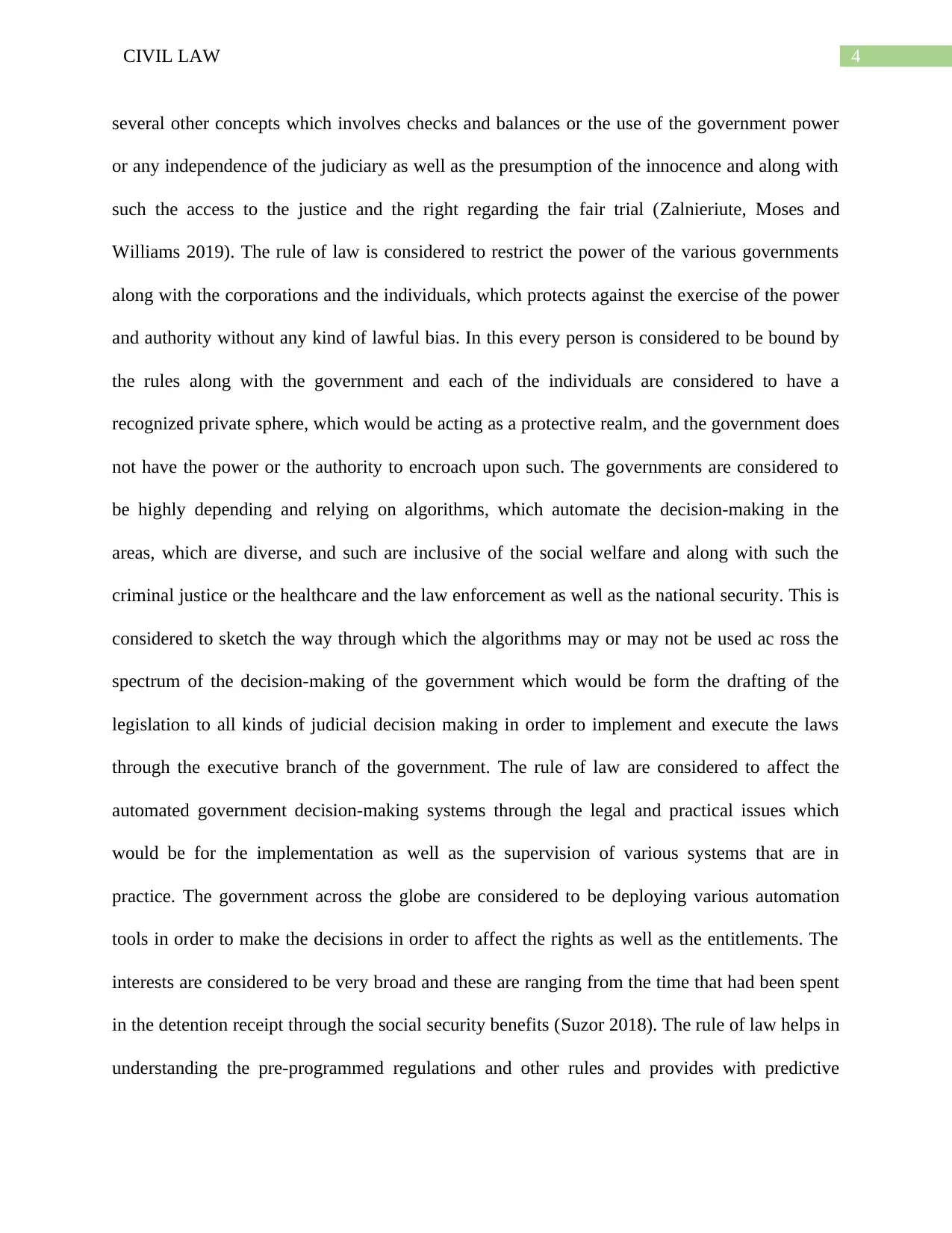
4CIVIL LAW
several other concepts which involves checks and balances or the use of the government power
or any independence of the judiciary as well as the presumption of the innocence and along with
such the access to the justice and the right regarding the fair trial (Zalnieriute, Moses and
Williams 2019). The rule of law is considered to restrict the power of the various governments
along with the corporations and the individuals, which protects against the exercise of the power
and authority without any kind of lawful bias. In this every person is considered to be bound by
the rules along with the government and each of the individuals are considered to have a
recognized private sphere, which would be acting as a protective realm, and the government does
not have the power or the authority to encroach upon such. The governments are considered to
be highly depending and relying on algorithms, which automate the decision-making in the
areas, which are diverse, and such are inclusive of the social welfare and along with such the
criminal justice or the healthcare and the law enforcement as well as the national security. This is
considered to sketch the way through which the algorithms may or may not be used ac ross the
spectrum of the decision-making of the government which would be form the drafting of the
legislation to all kinds of judicial decision making in order to implement and execute the laws
through the executive branch of the government. The rule of law are considered to affect the
automated government decision-making systems through the legal and practical issues which
would be for the implementation as well as the supervision of various systems that are in
practice. The government across the globe are considered to be deploying various automation
tools in order to make the decisions in order to affect the rights as well as the entitlements. The
interests are considered to be very broad and these are ranging from the time that had been spent
in the detention receipt through the social security benefits (Suzor 2018). The rule of law helps in
understanding the pre-programmed regulations and other rules and provides with predictive
several other concepts which involves checks and balances or the use of the government power
or any independence of the judiciary as well as the presumption of the innocence and along with
such the access to the justice and the right regarding the fair trial (Zalnieriute, Moses and
Williams 2019). The rule of law is considered to restrict the power of the various governments
along with the corporations and the individuals, which protects against the exercise of the power
and authority without any kind of lawful bias. In this every person is considered to be bound by
the rules along with the government and each of the individuals are considered to have a
recognized private sphere, which would be acting as a protective realm, and the government does
not have the power or the authority to encroach upon such. The governments are considered to
be highly depending and relying on algorithms, which automate the decision-making in the
areas, which are diverse, and such are inclusive of the social welfare and along with such the
criminal justice or the healthcare and the law enforcement as well as the national security. This is
considered to sketch the way through which the algorithms may or may not be used ac ross the
spectrum of the decision-making of the government which would be form the drafting of the
legislation to all kinds of judicial decision making in order to implement and execute the laws
through the executive branch of the government. The rule of law are considered to affect the
automated government decision-making systems through the legal and practical issues which
would be for the implementation as well as the supervision of various systems that are in
practice. The government across the globe are considered to be deploying various automation
tools in order to make the decisions in order to affect the rights as well as the entitlements. The
interests are considered to be very broad and these are ranging from the time that had been spent
in the detention receipt through the social security benefits (Suzor 2018). The rule of law helps in
understanding the pre-programmed regulations and other rules and provides with predictive
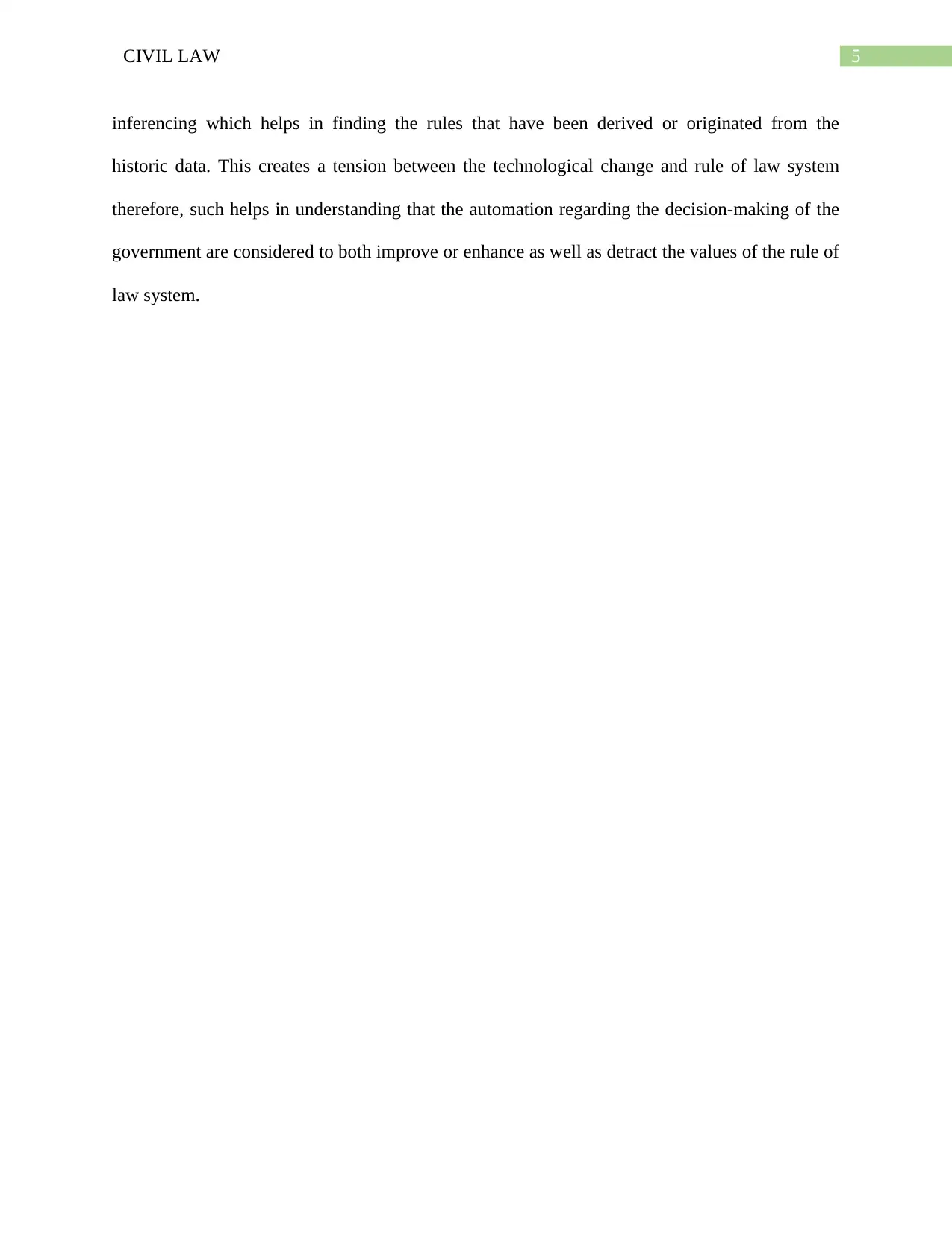
5CIVIL LAW
inferencing which helps in finding the rules that have been derived or originated from the
historic data. This creates a tension between the technological change and rule of law system
therefore, such helps in understanding that the automation regarding the decision-making of the
government are considered to both improve or enhance as well as detract the values of the rule of
law system.
inferencing which helps in finding the rules that have been derived or originated from the
historic data. This creates a tension between the technological change and rule of law system
therefore, such helps in understanding that the automation regarding the decision-making of the
government are considered to both improve or enhance as well as detract the values of the rule of
law system.
⊘ This is a preview!⊘
Do you want full access?
Subscribe today to unlock all pages.

Trusted by 1+ million students worldwide
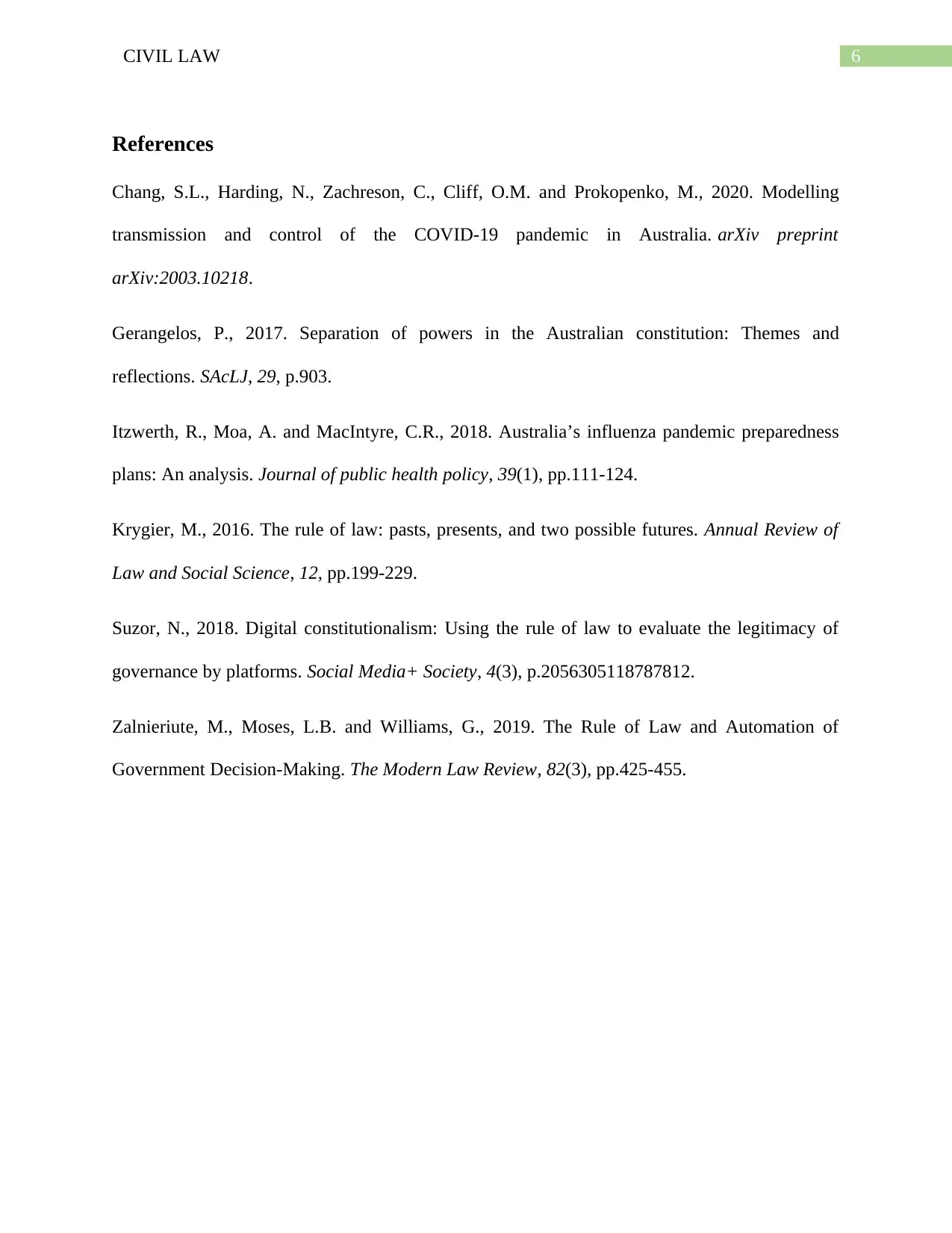
6CIVIL LAW
References
Chang, S.L., Harding, N., Zachreson, C., Cliff, O.M. and Prokopenko, M., 2020. Modelling
transmission and control of the COVID-19 pandemic in Australia. arXiv preprint
arXiv:2003.10218.
Gerangelos, P., 2017. Separation of powers in the Australian constitution: Themes and
reflections. SAcLJ, 29, p.903.
Itzwerth, R., Moa, A. and MacIntyre, C.R., 2018. Australia’s influenza pandemic preparedness
plans: An analysis. Journal of public health policy, 39(1), pp.111-124.
Krygier, M., 2016. The rule of law: pasts, presents, and two possible futures. Annual Review of
Law and Social Science, 12, pp.199-229.
Suzor, N., 2018. Digital constitutionalism: Using the rule of law to evaluate the legitimacy of
governance by platforms. Social Media+ Society, 4(3), p.2056305118787812.
Zalnieriute, M., Moses, L.B. and Williams, G., 2019. The Rule of Law and Automation of
Government Decision‐Making. The Modern Law Review, 82(3), pp.425-455.
References
Chang, S.L., Harding, N., Zachreson, C., Cliff, O.M. and Prokopenko, M., 2020. Modelling
transmission and control of the COVID-19 pandemic in Australia. arXiv preprint
arXiv:2003.10218.
Gerangelos, P., 2017. Separation of powers in the Australian constitution: Themes and
reflections. SAcLJ, 29, p.903.
Itzwerth, R., Moa, A. and MacIntyre, C.R., 2018. Australia’s influenza pandemic preparedness
plans: An analysis. Journal of public health policy, 39(1), pp.111-124.
Krygier, M., 2016. The rule of law: pasts, presents, and two possible futures. Annual Review of
Law and Social Science, 12, pp.199-229.
Suzor, N., 2018. Digital constitutionalism: Using the rule of law to evaluate the legitimacy of
governance by platforms. Social Media+ Society, 4(3), p.2056305118787812.
Zalnieriute, M., Moses, L.B. and Williams, G., 2019. The Rule of Law and Automation of
Government Decision‐Making. The Modern Law Review, 82(3), pp.425-455.
1 out of 7
Related Documents
Your All-in-One AI-Powered Toolkit for Academic Success.
+13062052269
info@desklib.com
Available 24*7 on WhatsApp / Email
![[object Object]](/_next/static/media/star-bottom.7253800d.svg)
Unlock your academic potential
Copyright © 2020–2025 A2Z Services. All Rights Reserved. Developed and managed by ZUCOL.





